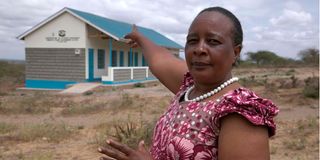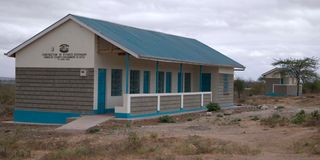How one woman’s campaign led new dispensary in Kitui’s remote village

Naomi Mumo, speaking at the Kyeng’e Dispensary in this picture taken on July 5, 2025. She was pivotal in the construction of the dispensary. The locals had been travelling for more than 20 kilometers to the nearest health facility before the intervention spearheaded by her.
What you need to know:
- Naomi Mumo, a mother of three from Kitui, had to walk over 20km for medical care during her pregnancies.
- She led a community campaign that raised Sh230,000 to buy land after the county government said they couldn't build a dispensary due to lack of public land.
- The village now has a newly constructed dispensary awaiting equipment and staff.
When Naomi Mumo fell pregnant with her first child shortly after marriage, she discovered a harsh reality that would define her next few years: the nearest clinic was more than 20 kilometres away.
For this mother of three from Kisayani village in Kitui West, each antenatal appointment meant an exhausting trek across dusty terrain. The same gruelling journey awaited her for post-natal care with each of her children.
She wasn't alone—scores of other mothers in the village faced the same ordeal, forcing them to choose between their health and the physical demands of such distant medical care.
"I decided to spearhead a campaign to compel the county government to build a dispensary in the village to help expectant and nursing mothers, the elderly, and residents easily access much-needed medical services," Naomi explains.
"The suffering was too much to bear, and we had to do something."
Community fundraiser
But even the most determined advocacy faces bureaucratic hurdles. The county government proved willing to build a dispensary, but delivered disappointing news: there was no public land available for the project.
Undeterred, Naomi and her fellow campaigners found an innovative solution.
"With lack of land being the major reason given for the failure to build a dispensary, we organised a community fundraiser and managed to raise Sh230,000 to buy a quarter-acre piece of land where the health facility has now been built," she says.
On a bright sunny afternoon, Naomi's joy is unmistakable as she leads visitors to the newly constructed dispensary—a tangible symbol of what community determination can achieve.
"I am a very excited woman with these developments," she beams.
"Expectant and nursing mothers will no longer be required to travel long distances to seek antenatal and postnatal care. The elderly in our village will also get relief from having to go far for medical services."
The dispensary stands ready, but the final hurdle remains: it needs equipment, medical supplies, and qualified staff before it can open its doors to patients.

The Kyeng’e Dispensary in Kauwi Ward, Kitui West in this picture taken on July 5, 2025. The dispensary was constructed by the Kitui County government following the intervention of Naomi Mumo and locals.
For residents of the dry Kisayani village, the new facility represents hope after years of healthcare hardship.
Purity Mueni, a mother of two with a young baby, cannot contain her excitement about the transformation ahead.
"We were really suffering as the distance to the nearest hospital was very far," Mueni says.
"It will now be easy to access pre-natal and post-natal care for our children. We are appealing to the county government to urgently equip the dispensary and post staff with the relevant medical supplies so that we can start enjoying these services."
Stephen Munyao, who manages both diabetes and hypertension, describes the dispensary as "long overdue." For him, the facility promises relief from arduous journeys for essential medication.
"I normally have to travel very far to get the drugs to manage diabetes and high blood pressure," Munyao explains. "Having the dispensary nearby is good news as it means I will now be able to get them more readily and easily."
The challenges faced by Kisayani residents reflect broader healthcare access issues across Kitui County, where poverty and geographical barriers create significant obstacles. Despite ongoing efforts to improve access through initiatives like Universal Health Coverage, which aims to provide quality preventive, curative, rehabilitative, and specialised services within public health facilities, many residents remain underserved.
The statistics paint a stark picture: in 2021, over 60 per cent of Kitui residents were classified as poor, with fewer than 30 per cent of households holding health insurance. Areas in Kitui East, South, and Central are particularly underserved, forcing residents to travel considerable distances for basic healthcare.
But Naomi's work is far from finished. As our conversation draws to a close, she reveals her next community project with characteristic enthusiasm.
"I'm now spearheading the building of a day-care facility in the local market to enable women with young babies a place to leave them whilst they sell their wares," she explains.
"The day-care will help nursing mothers have a safe place where they can keep their children as they work in the market instead of staying at home."
From healthcare access to childcare solutions, Naomi continues to tackle the practical challenges that hold back women in her community—one campaign at a time.


